The distinction between 16-gauge and 18-gauge nails is often little. In this post, we’ll answer all your questions about how to use each type of nail with a different model gun! We’ll go through several popular items to assist you make a better option. The 16 gauge nail gun is the perfect choice for professional builders, but if you’re just getting started and want to use 18-gauge nails instead then keep reading.
About 16-Gauge Finish Nailer
Nail guns come in a variety of forms and styles. The 16-gauge nailer is a pneumatic tool that drives nails into numerous materials using compressed air. This versatile firearm can be used for tasks such as trimming and molding, making it an essential piece of equipment in any professional builder’s arsenal or someone just starting out!
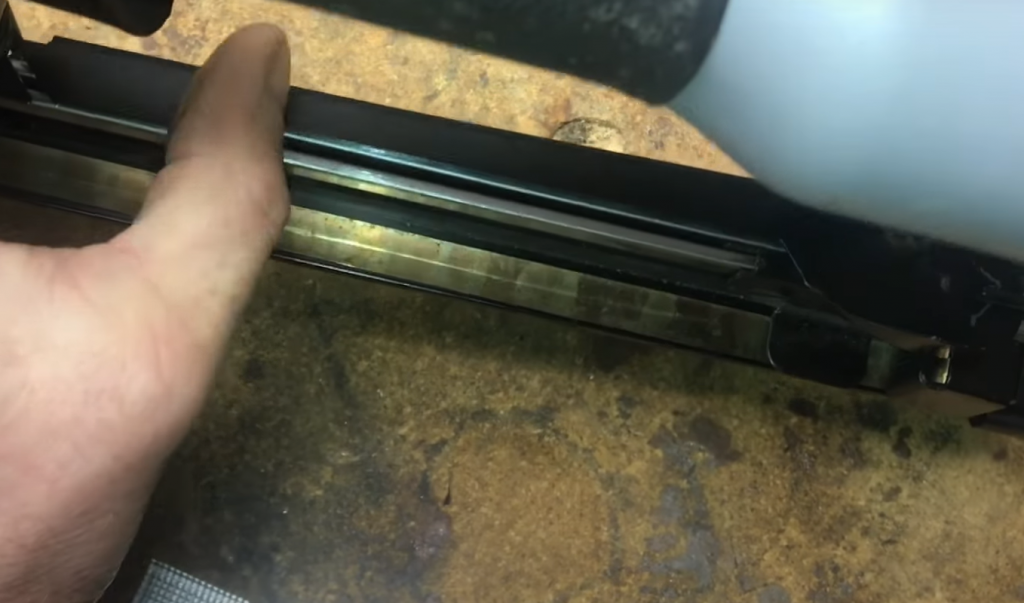
The 16 gauge finish nailer is a versatile and tough tool that can be used for various heavy-duty nailing projects.
Here are a few of the most important characteristics to search for in a 16 gauge nailer:
- A durable body: For those who like to work hard and play even harder, don’t settle on just any heavy duty tool. You need a model that can handle constant use so look for one with an aluminum or steel body made durable enough for your utmost exertions.
- Adjustable depth control: With this feature, you can decide how deep you want the nails driven into the wood. This is crucial since driving the nails too deep might cause them to split the timber.
- A comfortable grip: Heavier 16 gauge nailers aren’t as easy to hold for long durations. For this reason, consider buying one with an ergonomic grip so that you have better control and don’t strain your hands while working on projects. [1]
About 18-Gauge Brad Nailer
Brad nails are perfect for the smaller projects that you need to take on around your house. Brad-nailers are the recommended tools for 18 gauge brads, which make them great when using thinner materials like picture frames and molding.
The 18 gauge is a great choice for delicate jobs. It has less power than other types of finish or cabinet installation, but it can still handle most projects with ease!
Some key features to consider when purchasing a 18 gauge include:
- A lightweight body: The lightest brad nailer on the market is the 18 gauge. Look for a model that weighs less than five pounds to minimize fatigue during extended use.
- A narrow body: It’s critical to have a tool that can fit in confined locations when performing delicate tasks, such as framing. Look for a nailer with a slim body to make it easy to maneuver in tight quarters.
- A depth adjustment knob: The depth-stop feature on this tool lets you decide how far the nails go into the wood. The 16 gauge nails are delicate and should be handled with care. If you drive them too deep, they can split the wood and cause damage that is not only expensive but also unnecessary. [2]
16 Gauge Finish Nailer Vs 18 Gauge Brad Nailer: The Top Differences
If you’re not sure whether to buy a 16 or 18 gauge finish nailer, it’s essential to understand the difference between them so that you can pick the right one for your needs. Here’s what you need to know:
- The 16 gauge is perfect for jobs that require more robust nails, such as hardwood floors.
- A sixteen gauge is better equipped to handle tougher projects. For smaller tasks and details, 18-gauge wire nails will do just fine.
- The size of your nails is the most significant distinction. The 16 gauge has thicker shanks than the 18. Might want to start with this one.
- 16 gauge nails are more likely to break the wood if they’re driven in too far.
- If you’re looking for nails that won’t damage your wood, opt for smaller nails like 18 gauge.
What kind of finish nailer is ideal for you? The 16 gauge finishing tool can handle even the most challenging jobs while still being lightweight enough to use on delicate projects. If 18 gauge brad nails are what you’re looking forward to, this might be just right.
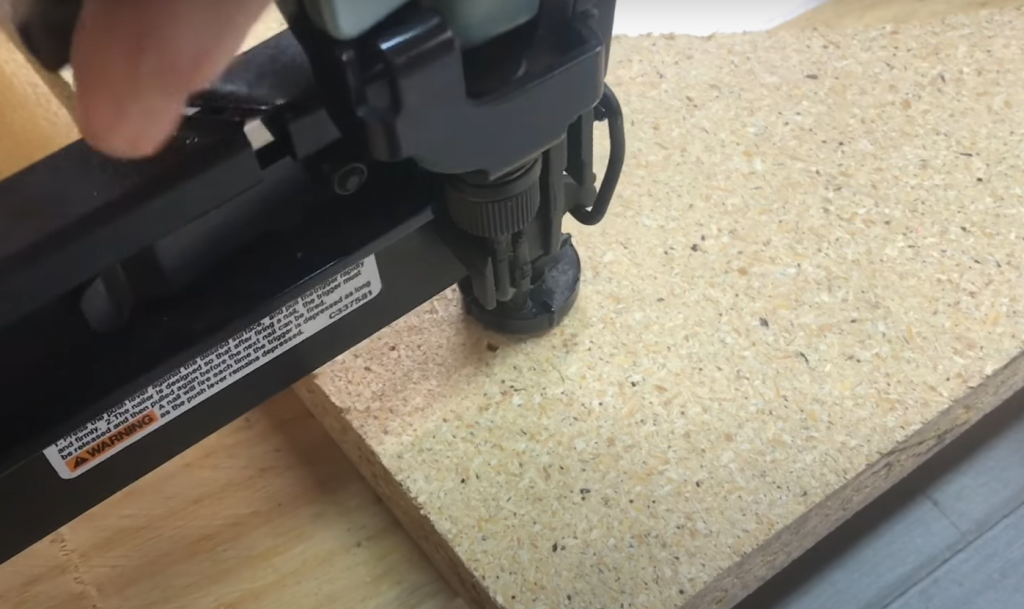
Whatever sort of finish nailer you pick, double-check the manufacturer’s handbook before using it. And always wear safety goggles when operating any type of power tool. [3]
What Exactly Happens If You Swap Nail Sizes For Nailers?
It is indeed true that 16-gauge nails will not fit into an 18-gauge nail gun, and the inverse is also accurate. The difference between these gauges is too great for your tools to handle so they’ll either get jammed or shoot through without making contact with whatever material you’re trying to fasten it onto. Either way, it’s not something you want to mess around with.
If you need to switch the size of your nails in your nailer, follow these steps. The greatest solution is to purchase a new tool that can handle the nails you require. However, if that’s not possible or practical, there are a few ways you can make do with what you have.
One option is to use a spacer. This is a small piece of metal or plastic that goes between the nail and the tool, taking up the extra space so that the nail can be driven in properly. You can usually find spacers at your local hardware store.
Another option is to file down the nails so they fit into the tool. This isn’t ideal, since it can damage the nails and make them more likely to break, but it’s better than nothing.
Finally, you could try using adhesive tape on the tips of the nails. This will help them fit into the gun while still providing a good grip. Just be sure to use a strong tape so it doesn’t come off mid-project. [4]
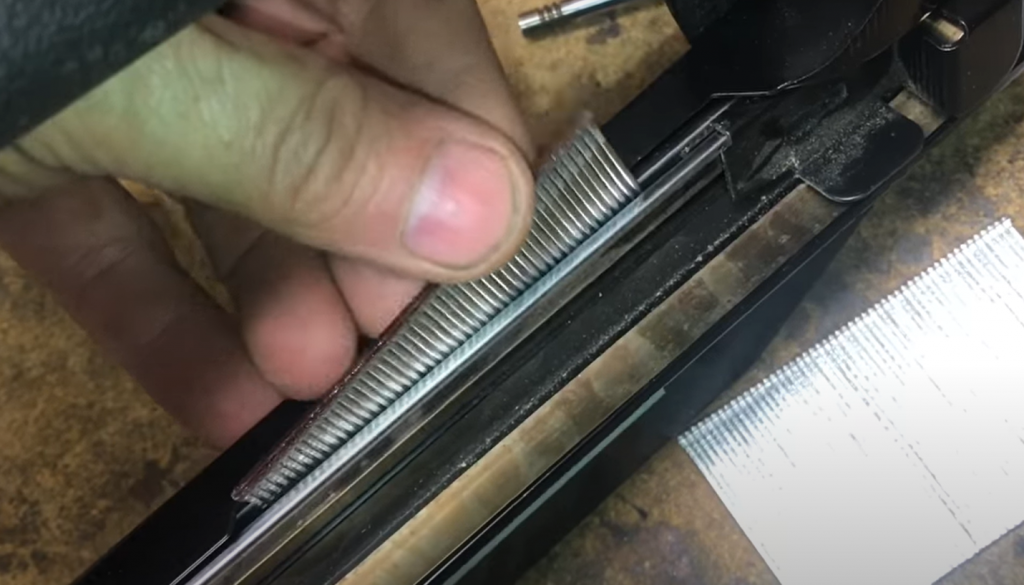
All of these options are less than ideal, but they’ll work in a pinch. If you can, though, it’s always best to get the right tool for the job.
FAQ
Can you use different size nails in a nail gun?
Incorrectly sized nails can cause your projects to look unfinished and sloppy. This will help avoid damage to both your equipment and your project. If you choose nails that are too small, the materials may not stay together. If you put nails with too much length on the material, they may harm it or cause nail guns to get stuck.
Most nail guns are designed to work with a specific range of nail sizes.
If your nails are too large or small for the equipment, they will not work properly.However, there are some situations where you may need to use a different size nail than what your nail gun is designed for. For example, you may need to use a smaller nail if you’re working with delicate materials that can be easily damaged. Or, you may need to use a larger nail if you’re working with particularly thick or tough materials.
In these situations, you can usually still use your nail gun by making a few adjustments. For example, if you’re using such a combination, the pressure setting on the tool may need to be increased. By doing this, the nails will be able to penetrate the material more effectively.
What is the difference between 16 and 18 gauge nails?
The shank is the metal rod that connects the head of the nail to the body. The diameter of this component varies based on the gauge of your nail. The size of a nail’s shank can affect how deeply it is able to penetrate into wood. A 16 gauge nail will have more success driving holes than an 18g one because its larger circumference allows for greater biting power when drilling metal or drywall; however, if you plan on using your favorite pair often then get yourself some higher-quality nails with thinner heads – they’re perfect for lighter jobs.
What size nails does a 16 gauge nailer use?
His strength comes from a nail gun that fires 16-diameter spikes. The diameter of these nails is between 0.059 and 0.064 inches.
The average wire nail is made of 16 gauge wire, 0.067 to 0.070 inches in diameter. It’s not recommended to use this combination. If your nails are too thick, they might clog the tool and cause it to jam.
Avoid loading the wrong size nails into your nailer by always consulting your manual before beginning any project.
What are 18 gauge nails used for?
Nails of the same size and weight as common nails may be used to finish delicate tasks like carpentry, molding, and trim. They’re also great for working with softer woods. You’ll need 18 gauge nails if you want your woodworking project to be accurate.
When it comes to difficult work, 8 gauge nails are preferable because they are more durable. In many cases, however, 12 and 14 gauge nails must be trimmed. When you’re working on projects that require larger than life construction, it’s important to have the right tools for every task. You’ll want to buy both 18 gauge nails and 16-gauge nailers so that your work won’t be held back by a lack of airflow or one tool underperforming.
Is an 18 gauge brad nailer good for baseboard?
An 18 gauge is an excellent option if you’re searching for a tool to help you install baseboard trim. The design of this nailer is perfect for people who want to do finishing work, as it gives you the ability to put nails into difficult-to-reach places. There are several things to bear in mind before purchasing an 18 gauge brad nailer.
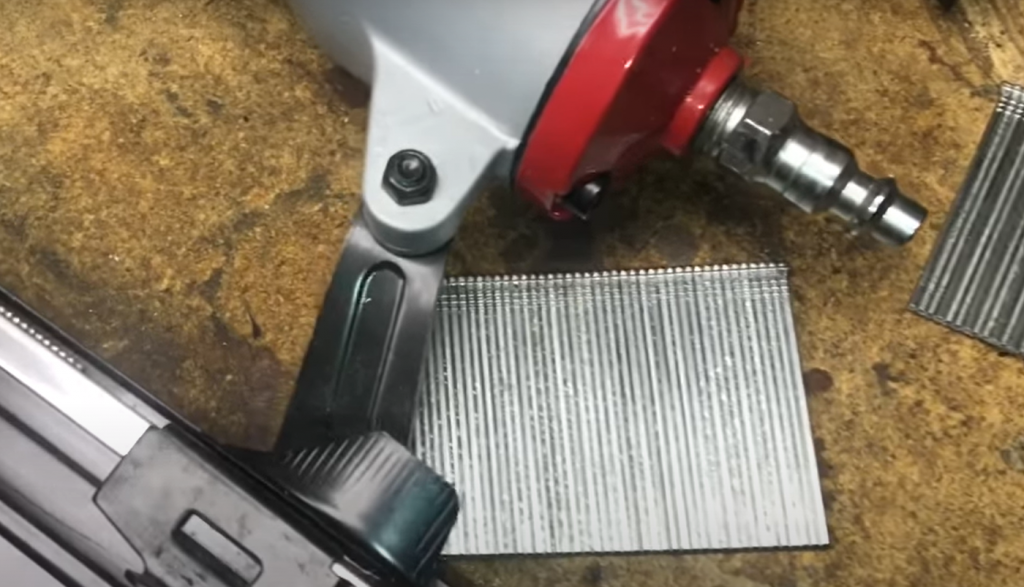
The first item to think about is the size. These gauge may be used to install baseboards, it isn’t as strong as a 16 gauge. This tool isn’t intended for more complicated trimming.
To avoid damage and ensure a tight fit, use nails that are the proper size when working with an 18 gauge on baseboard installation. If you opt for tiny nails, the trim won’t stay in place. If you utilize nails that are too big, they may split the trim or cause additional harm.
What is better a brad nailer or finish nailer?
This is a common question when people are looking for the best tool to use for their project. The answer differs depending on what you want to accomplish and the sort of finish you desire. If you want a smooth, clean finish, choose a brad nailer. If the appearance doesn’t matter to you as much, any old finish nailer will suffice.
In general, a brad nailer is best for delicate tasks while a finish nailer is sturdier and can handle heavier duty work. It’s critical to get the appropriate tool for the task. To avoid any issues, make sure you choose the proper tool for the job.
Can I use 18-gauge nails for trim?
Trimming large can be performed using them. The most important distinction between using this combination is that the latter is somewhat thinner, resulting in less of a hole in your trim.
An 18-gauge nail is advantageous for many reasons when used in a smaller nail gun. If you’re working with delicate molding or trim, then you probably don’t want to damage it. Maybe you’re also trying to not create too much work for yourself down the road.
If you’re going to use combination for any reason, there are a few things to bear in mind. Make sure your 16-gauge nailer can handle 18-gauge nails; you don’t want to begin working only to discover that your tools aren’t compatible.
Useful Video: what HAPPENS when you put the WRONG nails in your air nailer
Conclusion
You may also use large gauge nails in a 16-gauge nailer, as shown above. However, there are some potential risks involved that you should be aware of before attempting this. For your trim work, we recommend using 18-gauge nails. If you need something stronger for baseboards or other applications, get a different gauge. If you have questions about which size nails to use in your nail gun, leave a comment below, and we’ll answer them. We hope you found this guide helpful! Thanks for reading.
References:
- https://www.electronicshub.org/18-gauge-brad-nail-vs-16-gauge-finish-nailer/
- https://www.drillanddriver.com/16-gauge-vs-18-gauge-nailer/
- https://housegrail.com/16-gauge-vs-18-gauge-nailer/
- https://nailerpros.com/can-you-use-18-gauge-nails-in-a-16-gauge-nailer/
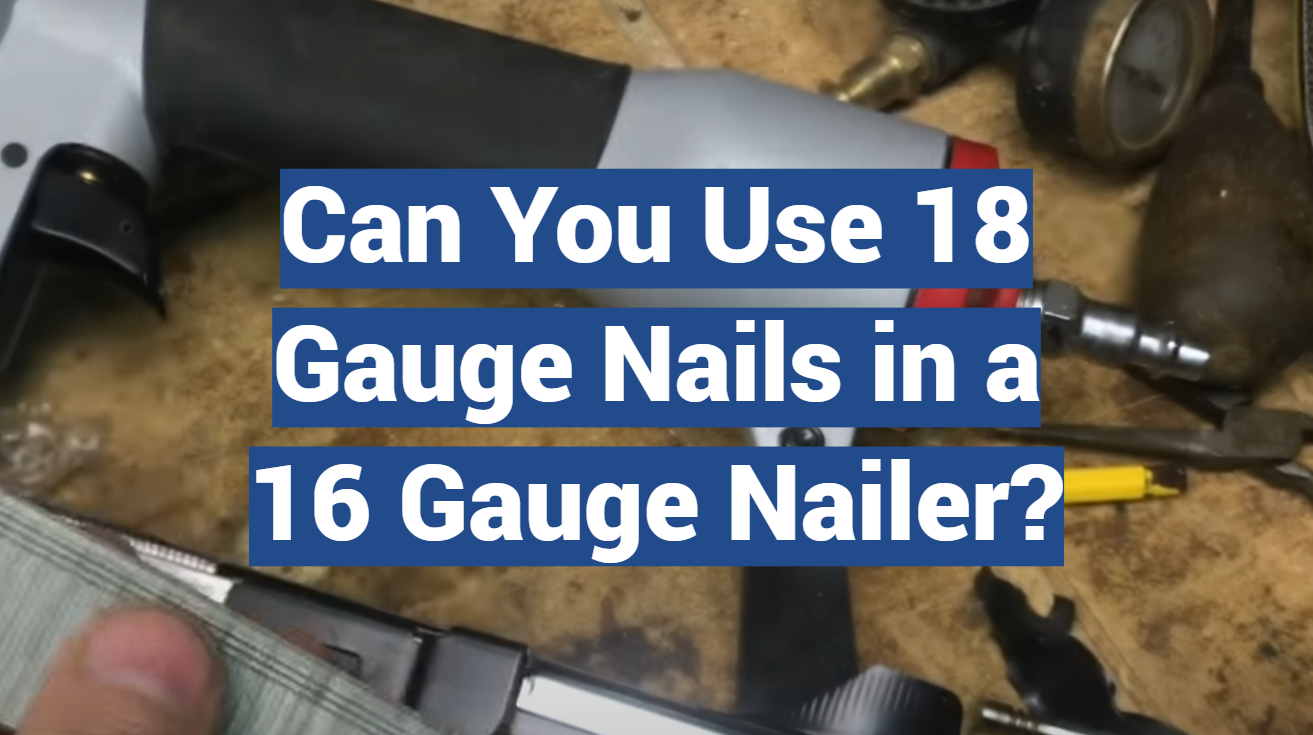




Leave a Reply